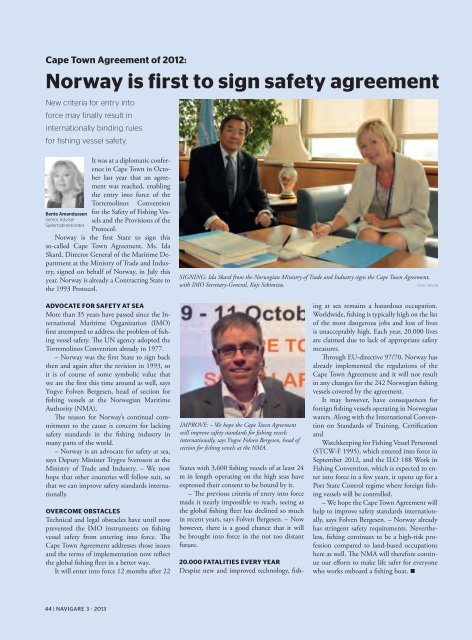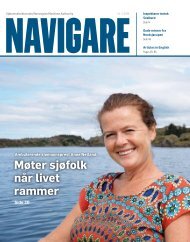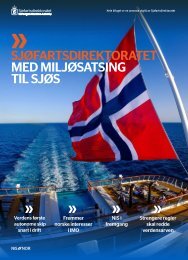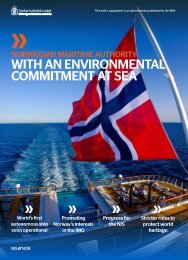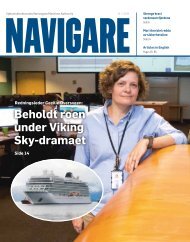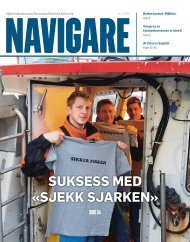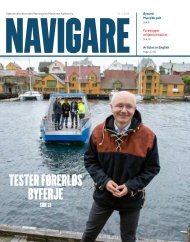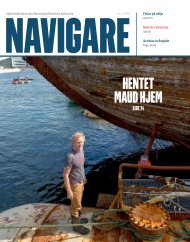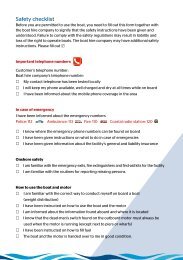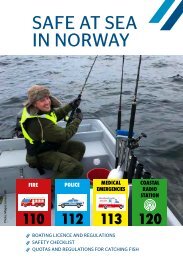Navigare 3 2013
Create successful ePaper yourself
Turn your PDF publications into a flip-book with our unique Google optimized e-Paper software.
Cape Town Agreement of 2012:<br />
Norway is first to sign safety agreement<br />
New criteria for entry into<br />
force may finally result in<br />
internationally binding rules<br />
for fishing vessel safety.<br />
It was at a diplomatic conference<br />
in Cape Town in October<br />
last year that an agreement<br />
was reached, enabling<br />
the entry into force of the<br />
Torremolinos Convention<br />
for the Safety of Fishing Vessels<br />
and the Provisions of the<br />
Protocol.<br />
Norway is the first State to sign this<br />
Bente Amandussen<br />
Senior Adviser<br />
Sjøfartsdirektoratet<br />
so-called Cape Town Agreement. Ms. Ida<br />
Skard, Director General of the Maritime Department<br />
at the Ministry of Trade and Industry,<br />
signed on behalf of Norway, in July this<br />
year. Norway is already a Contracting State to<br />
the 1993 Protocol.<br />
AdVOCATE FOR SAFETY AT SEA<br />
More than 35 years have passed since the International<br />
Maritime Organization (IMO)<br />
first attempted to address the problem of fishing<br />
vessel safety. The UN agency adopted the<br />
Torremolinos Convention already in 1977.<br />
– Norway was the first State to sign back<br />
then and again after the revision in 1993, so<br />
it is of course of some symbolic value that<br />
we are the first this time around as well, says<br />
Yngve Folven Bergesen, head of section for<br />
fishing vessels at the Norwegian Maritime<br />
Authority (NMA).<br />
The reason for Norway’s continual commitment<br />
to the cause is concern for lacking<br />
safety standards in the fishing industry in<br />
many parts of the world.<br />
– Norway is an advocate for safety at sea,<br />
says Deputy Minister Trygve Svensson at the<br />
Ministry of Trade and Industry. – We now<br />
hope that other countries will follow suit, so<br />
that we can improve safety standards internationally.<br />
OVERCOME OBSTACLES<br />
Technical and legal obstacles have until now<br />
prevented the IMO instruments on fishing<br />
vessel safety from entering into force. The<br />
Cape Town Agreement addresses those issues<br />
and the terms of implementation now reflect<br />
the global fishing fleet in a better way.<br />
It will enter into force 12 months after 22<br />
44 | NAvigARe 3 - <strong>2013</strong><br />
SIGNING: Ida Skard from the Norwegian Ministry of Trade and Industry signs the Cape Town Agreement,<br />
with IMO Secretary-General, Koji Sekimizu. FOTO: IMO.UN<br />
IMPROVE: – We hope the Cape Town Agreement<br />
will improve safety standards for fishing vessels<br />
internationally, says Yngve Folven Bergesen, head of<br />
section for fishing vessels at the NMA.<br />
States with 3,600 fishing vessels of at least 24<br />
m in length operating on the high seas have<br />
expressed their consent to be bound by it.<br />
– The previous criteria of entry into force<br />
made it nearly impossible to reach, seeing as<br />
the global fishing fleet has declined so much<br />
in recent years, says Folven Bergesen. – Now<br />
however, there is a good chance that it will<br />
be brought into force in the not too distant<br />
future.<br />
20.000 FATALITIES EVERY YEAR<br />
Despite new and improved technology, fish-<br />
ing at sea remains a hazardous occupation.<br />
Worldwide, fishing is typically high on the list<br />
of the most dangerous jobs and loss of lives<br />
is unacceptably high. Each year, 20.000 lives<br />
are claimed due to lack of appropriate safety<br />
measures.<br />
Through EU-directive 97/70, Norway has<br />
already implemented the regulations of the<br />
Cape Town Agreement and it will not result<br />
in any changes for the 242 Norwegian fishing<br />
vessels covered by the agreement.<br />
It may however, have consequences for<br />
foreign fishing vessels operating in Norwegian<br />
waters. Along with the International Convention<br />
on Standards of Training, Certification<br />
and<br />
Watchkeeping for Fishing Vessel Personnel<br />
(STCW-F 1995), which entered into force in<br />
September 2012, and the ILO 188 Work in<br />
Fishing Convention, which is expected to enter<br />
into force in a few years, it opens up for a<br />
Port State Control regime where foreign fishing<br />
vessels will be controlled.<br />
– We hope the Cape Town Agreement will<br />
help to improve safety standards internationally,<br />
says Folven Bergesen. – Norway already<br />
has stringent safety requirements. Nevertheless,<br />
fishing continues to be a high-risk profession<br />
compared to land-based occupations<br />
here as well. The NMA will therefore continue<br />
our efforts to make life safer for everyone<br />
who works onboard a fishing boat.


